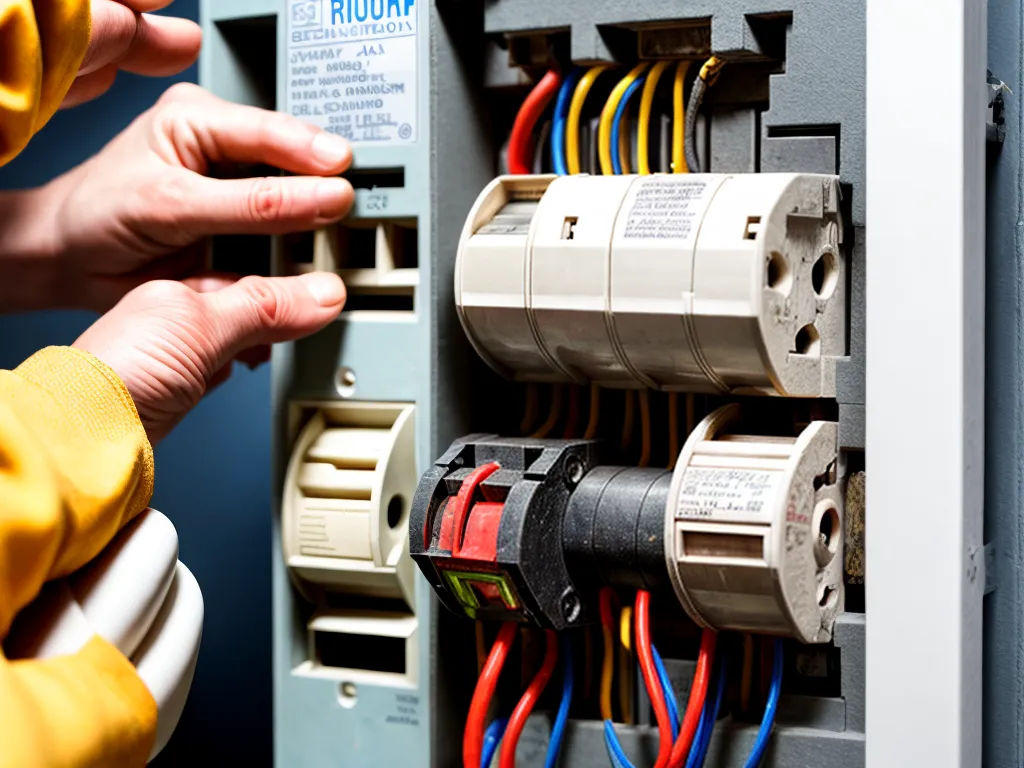
How to Replace a Circuit Breaker Without Shutting Off Power
Overview
Replacing a circuit breaker without shutting off power can be extremely dangerous if not done properly. Electrical shock and electrocution risks are high when working on live electrical wiring. However, there are some scenarios where you need to replace a faulty circuit breaker without shutting off main power. This usually occurs when the main breaker is inaccessible.
I do not recommend doing this yourself unless you are a licensed electrician with proper training and equipment. If possible, shut off power at the main breaker before replacing any circuit breaker.
If you must replace a circuit breaker while the circuit is still live, use extreme caution and follow proper safety procedures outlined below. Have an electrician assist if at all possible.
When Replacing a Live Circuit Breaker is Necessary
There are a few instances when it is necessary to replace a circuit breaker without shutting off main power:
-
The main breaker box is locked or otherwise inaccessible. This often occurs in commercial buildings and apartments.
-
The main breaker box is located far away from the faulty breaker. Shutting off the main breaker would cut power to essential appliances and systems.
-
The main breaker fails to shut off power when switched to the "OFF" position. This can be caused by a defective main breaker.
-
There is no main breaker or disconnect switch. Some older homes and buildings lack a master shut-off switch.
In these scenarios, replacing the individual circuit breaker while it is still live may be your only option. But again, call an electrician unless you are fully qualified to safely work on live electrical wiring.
Safety Equipment Needed
If you must replace a live circuit breaker, you need some specialized safety gear:
-
Insulated tools designed for live electrical work. This includes insulated screwdrivers, pliers, and wire cutters.
-
Electrical gloves rated for the voltage in your breaker box. They should be tested before use.
-
Safety goggles to protect your eyes from arcs or sparks.
-
A non-contact voltage tester to confirm the circuit is live before starting work.
-
An electrician's multimeter to double check there is no power flowing after disconnecting the old breaker.
-
A fiberglass ladder if the breaker box is high up. Never use a metal ladder when working on live circuits.
Wearing insulated protective gear is an absolute must when replacing a hot circuit breaker. Regular tools simply won't provide enough protection.
Step-By-Step Procedure
With the proper safety gear in place, here is a step-by-step guide to replacing a circuit breaker while the circuit is still live:
1. Turn Off Connected Devices
-
Turn off or unplug all devices connected to the circuit you'll be working on. Even in the "OFF" position, many devices draw a small amount of residual power.
-
Make sure the circuit you are working on does NOT supply power to any major appliances, especially refrigerators and freezers.
2. Confirm Circuit is Live
-
Open the breaker box panel and locate the faulty circuit breaker.
-
With the non-contact voltage tester, confirm the circuit is still live. The tester light should activate when near exposed conductors.
3. Disconnect Hot Wire
-
Put on all protective gear including gloves, goggles and clothing with no exposed skin.
-
Carefully grip the hot wire terminal on the breaker using properly insulated pliers. Do not touch any bare metal.
-
Loosen the terminal screw just enough to detach the hot wire. Move the wire safely out of the way.
4. Verify Circuit is De-Energized
-
With the hot wire detached, the circuit should now be de-energized. But always double check with a multimeter.
-
Touch the multimeter probes to the hot terminal on the breaker and the neutral bar. It should read 0 volts.
5. Remove Old Breaker
-
With power confirmed disconnected from the circuit, fully unscrew the hot terminal lug.
-
Remove the old circuit breaker from the breaker box panel. Gently tug it straight out to detach from the bus bar.
6. Install New Breaker
-
Align the new circuit breaker with the open slot in the panel. Push it straight in until fully seated on the bus bar.
-
Reinstall the hot wire under the terminal screw on the new breaker. Fully tighten the connection.
-
Restore power and turn connected devices back on. Verify normal operation.
When to Call an Electrician
I want to stress again that only a licensed electrician should replace a live circuit breaker in most cases. If you don't have the proper training and equipment, hire a professional rather than risking electrocution.
However, if you find yourself in a scenario where you absolutely must change a circuit breaker hot, follow the steps above very carefully. Have someone with you to call 911 in case of an accident.
Never attempt hot electrical work on high amperage circuits like those supplying large appliances and the furnace or AC. The risk is extreme. Instead, call an emergency electrician to safely restore power until proper repairs can be made with the main breaker shut off.
Stay safe and use extreme caution when maintaining live electrical systems. Hire a professional whenever possible.